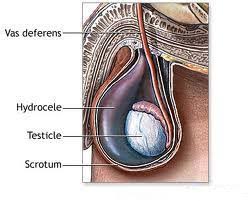
A hydrocele and a hernia are two distinct medical conditions that commonly affect the groin or scrotal region. A hydrocele occurs when fluid collects around the testicle, leading to swelling in the scrotum. It is generally painless and may resolve on its own in infants, but in adults, it can result from injury or inflammation. On the other hand, a hernia happens when internal tissues or organs, often part of the intestine, push through a weakened area in the abdominal wall. Hernias may cause noticeable bulges and discomfort, especially during physical activity. While both conditions can occur in males, hernias are more common and may require surgery for repair. Early diagnosis through physical examination and imaging tests ensures proper management. Consulting a healthcare provider is essential for appropriate treatment and to prevent complications.
Causes of Hydrocele:
- Infection, such as epididymitis
- IInjury or trauma to the scrotum
- nflammation of the testicles
- Blockage in the spermatic cord
- Post-surgical complications
Symptoms of Hydrocele:
- Painless swelling in one or both testicles
- A feeling of heaviness in the scrotum
- Discomfort or dull aching pain
What is a Hernia?
A hernia occurs when an internal organ or tissue pushes through a weak spot in the muscle wall, often in the abdominal area. It may appear as a visible bulge and can cause discomfort, especially during physical activities.
Causes of Hernia:- Heavy lifting or strenuous activity
- Chronic coughing or constipation
- Obesity
- Weak abdominal muscles
- Previous surgery
- Visible bulge in the affected area
- Pain or discomfort, especially while bending or lifting
- Burning or aching sensation
- Weakness or pressure in the abdomen
Ayurvedic Approach to Hydrocele and Hernia
Ayurveda offers a holistic approach to managing hydrocele and hernia by addressing the root cause, balancing doshas, and strengthening the muscles.
Ayurvedic Treatments for Hydrocele and Hernia:- Abhyanga (Oil Massage)
- Panchakarma Therapy
- Basti Therapy
- Herbal Medicines
- Yoga and Pranayama
Using medicated oils to reduce inflammation and promote circulation.
Detoxification procedures to remove toxins and balance Vata dosha.
Enema treatments with herbal oils to strengthen the abdominal muscles.
Formulations like Guggulu, Ashwagandha, and Triphala to reduce swelling and inflammation.
Specific asanas to strengthen the abdominal wall and improve digestion.
Lifestyle and Dietary Recommendations
- Consume a balanced, easily digestible diet.
- Avoid heavy lifting and strenuous activities.
- Stay hydrated and include fiber-rich foods to prevent constipation.
- Practice regular yoga and light exercises.
- Use warm compresses to relieve pain and swelling.
Why Choose Ayurvedic Treatment for Hydrocele and Hernia?
- Natural and non-invasive therapies
- Personalized treatment plans
- Focus on root cause healing
- Minimal side effects
- Enhanced overall well-being
Both hydrocele and hernia are manageable with proper medical care. Early diagnosis and timely treatment can prevent complications and improve quality of life. If you experience symptoms like swelling, pain, or a noticeable bulge in the groin or scrotum, consult a healthcare professional for evaluation and appropriate treatment.